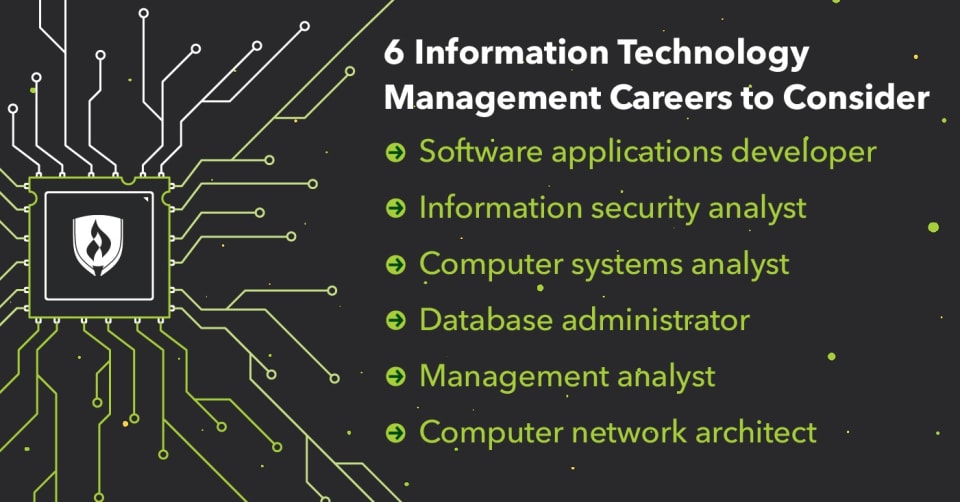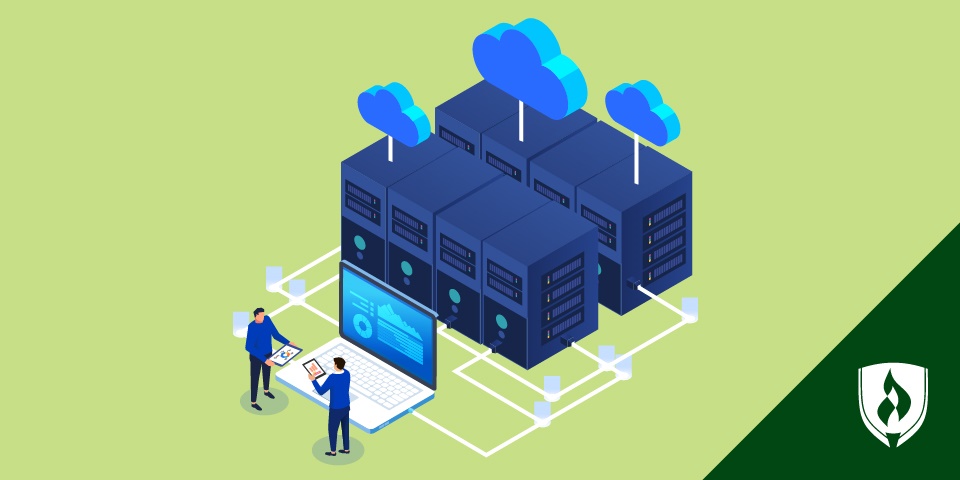What Can You Do With an IT Management Degree? 6 Career Options to Consider
By Callie Malvik on 02/24/2022

Whether you’re currently working in the technology field or doing something completely unrelated, you’re ready for a change. You’re ready to capitalize on your analytical abilities and tech-savvy nature to pursue a career in information technology management.
You have the baseline knowledge, the leadership qualities and the determination to grow. All that’s missing are the precise skills and technical knowhow needed to succeed in the field. And earning a degree in information technology (IT) management can help you fill those gaps.
But what can you do with an IT Management degree, exactly? Keep reading to find the answer to that question and more.
But first, what is IT management?
Before you explore the information technology careers you could pursue with this degree, it’s helpful to understand what exactly this training entails. An IT Management degree can provide students with advanced technical and analytical skills, leadership, project management and team management.
Project-based courses and hands-on learning opportunities help equip students to help organizations solve complex business issues with advanced technology solutions. They are exposed to everything from organizational support and risk-management to enterprise applications support.
Here’s a sampling of the courses you’ll find in the Rasmussen University IT Management program:
- Information Technology Systems Analysis
- IT Operations Management
- IT Management Security
- Infrastructure and Hardware
- IT Project Management Tools
The IT management curriculum covers a wide range of subjects, which provides graduates with the skills they need to pursue a variety of information technology careers.
6 Information technology management careers to consider
We used real-time job analysis software to examine more than 155,000 IT management degree jobs posted over the past year.1 The data helped us identify the top six careers available for individuals with an IT management degree. It should be noted that while all of these positions are seeking candidates with an IT degree, many may also require substantial work experience and not all should be considered entry-level.
Get a taste of the job duties and earning potential associated with each of these jobs in information technology.

1. Software applications developer
- Projected employment growth (2020-2030): 22 percent (much faster than average)2
What do software applications developers do?
Software applications developers are the creative minds behind computer programs. They are responsible for designing or customizing applications software. This often includes evaluating software requirements, developing testing procedures and modifying existing programs to optimize operational efficiency or correcting errors.
What skills do software applications developers need?
Software developers must possess a strong balance of technical and transferable skills. They use programming languages like Java, Python and JavaScript to design and improve programs. In addition to these precise skills, they must be adept in communication and collaboration. These developers must also have the ability to troubleshoot and solve problems as issues arise.
Learn more about this information technology career in our article, “What Does a Software Developer Do?”
2. Information security analyst
- Projected employment growth (2020-2030): 3 percent (much faster than average)2
What do information security analysts do?
Information security analysts protect organizations against cyber attacks. They do this by monitoring networks for security breaches and investigating when one is detected. They are responsible for installing and maintaining software to protect sensitive information and developing and enforcing security standards for the company.
What skills do information security analysts need?
Information security analysts must be well-versed in information systems and network security. They need to know how to perform vulnerability assessments, penetration testing and intrusion detection in order to safeguard their company’s data. Research and writing skills are also critical in order to identify and properly address a security issue.
Learn more about this information technology career in our article, “How to Become an Information Security Analyst.”
3. Computer systems analyst
- Projected employment growth (2020-2030): 7 percent (as fast as average)2
What do computer systems analysts do?
Computer systems analysts examine data processing problems to improve computer systems and enhance system compatibility so information can easily be shared. They develop and test system design procedures and consult with management to recommend software.
What skills do computer systems analysts need?
Computer systems analysts must have a solid understanding of business processes and information systems. Project management skills also help them efficiently plan and activate the work needed from their team. Strong communication skills are essential because they’re often the ones bridging the gap between technology teams and business leaders.
Learn more about this information technology career in our article, “What Is a Computer Systems Analyst?”
4. Database administrator
- Projected employment growth (2020-2030): 8 percent (as fast as average)2
What do database administrators do?
Database administrators use specialized software to store and organize data. They test and administer computer databases and coordinate changes to correct errors. They are also responsible for indicating user access levels for different segments of a database, applying security measures to safeguard information.
What skills do database administrators need?
Database administrators should have a strong familiarity with Structured Query Language (SQL), which is a domain-specific language designed for managing data. Other important skills range from data warehousing and performance tuning to Oracle and Python. Attention-to-detail and complex problem solving also come in handy for these tech pros.
Learn more about this information technology career in our article, “What Is a Database Administrator?”
5. Management analyst
- Projected employment growth (2020-2030): 14 percent (much faster than average)2
What do management analysts do?
Management analysts create reports and representations to advise managers on ways to increase profitability. They do this by compiling information about a problem or procedure that needs improvement, conducting onsite observations or interviews to identify appropriate solutions.
What skills do management analysts need?
Management analysts need to have a healthy blend of business acumen and technology know-how. Business analysis, budgeting, process improvement and project planning are all important skills to possess. And it should go without saying that communication skills and problem solving are essential qualities as well.
6. Computer network architect
- Projected employment growth (2020-2030): 5 percent (slower than average)2
What do computer network architects do?
Computer network architects design and implement computer and information networks, making repairs or upgrades based on company or customer needs. They perform network modeling, analysis and planning and coordinate installation of new equipment when necessary.
What skills do computer network architects need?
Computer network architects must be proficient in network engineering and system configuration. Knowledge of things like Wide Area Networks (WAN), Border Gateway Protocol (BGP) and Virtual Private Networking (VPN) are also important. These technical skills are often complemented by strong communication skills and customer service abilities.
Start your career in information technology management
So what can you do with an information technology management degree? As you can see, there isn’t a single answer. With this dynamic training and versatile skillset, you can determine which career path aligns best with your professional goals.
Learn more about how you can qualify yourself for these information technology careers by visiting our IT Management Degree page.
1Burning-Glass.com (analysis of 155,753 information technology management jobs, Jan. 01, 2019 – Dec. 31, 2019).
2Bureau of Labor Statistics, U.S. Department of Labor, Occupational Outlook Handbook, [accessed June 2022] www.bls.gov/ooh/. Information represents national, averaged data for the occupations listed and includes workers at all levels of education and experience. Employment conditions in your area may vary.
EDITOR'S NOTE: This article was originally published in June 2013. It has since been updated to reflect information that is relevant to 2022.




